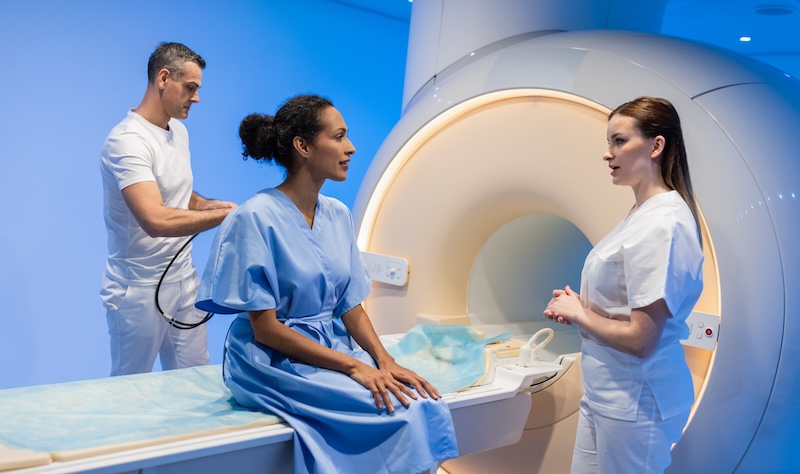Patients
Florida Interventional Specialists is a leader in the Florida vascular and interventional radiology market and provides exceptional, high-quality, compassionate care. We are committed to educating our hospital-affiliated colleagues and trainees and believe that our collaboration and enhanced communication with our clinical colleagues are catalysts for the advancement of care for the patients we serve.

What Is Interventional Radiology?
Interventional radiology (IR) is the medical specialty devoted to advancing patient care through the innovative integration of clinical and imaging-based diagnosis and minimally invasive therapy.
Interventional radiologists are board-certified physicians who specialize in minimally invasive, targeted treatments. They offer the most in-depth knowledge of the least invasive treatments available coupled with diagnostic and clinical experience across all specialties. They use X-rays, MRI and other imaging to advance a catheter in the body, usually in an artery, to treat at the source of the disease non-surgically. As the inventors of angioplasty and the catheter-delivered stent, which were first used in the legs to treat peripheral arterial disease, interventional radiologists pioneered minimally invasive modern medicine.
Today many conditions that once required surgery can be treated nonsurgically by interventional radiologists. Interventional radiology treatments offer less risk, less pain and less recovery time compared to open surgery.
What Is NeuroInterventional Radiology?
NeuroInterventional Radiology (NIR) is a treatment approach to conditions that occur within the vessels of the brain or within the spinal cavity. Utilized in place of more invasive procedures which require opening the skull or exposing the spinal column, neurointerventional procedures are minimally invasive, meaning they can be accomplished through tiny incisions no bigger than the size of a nickel. In the case of conditions affecting the brain, practitioners first insert a catheter, resembling a long tube, into the groin and then thread it up through the vessels to the problem site. Once the catheter is in place, dependent on the condition, physicians can deliver medications or utilize medical devices to accomplish treatment.
For spinal anomalies resulting from compression fractures, tumors of the spine or narrowing of the spinal canal, practitioners insert cannulas, again resembling tubes, directly at the problem site and work through them to alleviate any pressure on the nerve area in order to relieve the patient of pain.
In both cases, what makes it possible for practitioners to utilize this minimally invasive technique is technology which transmits internal images of the brain or the spine on a large screen throughout the procedure allowing them to clearly visualize the problem area.
Because neurointerventional treatments are considered less invasive than more traditional modes of treatment yet yield optimal treatment outcomes, they are often attractive options to patients. Please refer to the section on Conditions and Treatments to better understand the conditions that can be treated using neurointerventional techniques, as well as the way that these treatments work.
FAQs
Interventional radiology is the medical specialty devoted to advancing patient care through the innovative integration of clinical and imaging-based diagnosis and minimally invasive therapy.
Interventional radiologists are doctors who specialize in minimally invasive, targeted treatments performed using imaging for guidance. They use their expertise in reading X-rays, ultrasound, MRI and other diagnostic imaging, to guide tiny instruments, such as catheters, through blood vessels or throughthe skin to treat diseases without surgery. Interventional radiologists are board-certified and fellowship trained in minimally invasive interventions using imaging guidance. The American Board of Medical Specialties certifies their specialized training. Your interventional radiologist will work closely with your primary care or other physician to be sure you receive the best possible care.
Interventional radiologists use imaging, like X-rays or MRIs, to see inside a patient’s body, pinpoint where the problem is and map out how to get there without surgery. Interventional radiologists then guide catheters through the vascular system, other pathways in the body, or through the skin, to treat disease or tumors directly at the source, via a small nick in the skin and X-ray guidance.
No. Advances in diagnostic imaging gave rise to interventional radiology in the mid 1970s by combining specialized training in nonsurgical techniques with imaging. Interventional radiologists pioneered modern medicine with the invention of angioplasty and the first catheter delivered stent, which were initially used to treat blocked arteries in the legs, saving patients from surgery or amputation.
While no treatment is risk free, the risks of interventional radiology procedures are far lower than the risks of open surgery, and are a major advance in medicine for patients.
- Most procedures can be performed on an outpatient basis or require only a short hospital stay
- General anesthesia is usually not required
- Risk, pain and recovery time are often significantly reduced
- Procedures can be less expensive than surgery or other alternatives
The highest standards of patient safety have been incorporated into the development of these procedures, because interventional radiology and diagnostic radiology training programs include radiation safety, radiation physics, the biological effects of radiation and injury prevention. The FDA, hospitals, state regulatory groups and other medical specialists that are involved in the practice of interventional procedures use our published standards, which include training, experience, technique and patient care.


Meet the Physicians
View our world-renowned physicians and read about their history with Florida Interventional Specialists.


CUSTOMIZED, COMPASSIONATE CARE
At Florida Interventional Speecialists, our physicians are not only highly specialized leaders in their field but are deeply committed to providing a tailored, compassionate care plan for their patients, setting a gold standard for service excellence.


THE MOST ADVANCED TECHNOLOGY AVAILABLE
Our dedicated physicians utilize cutting-edge technology to ensure you receive the most advanced, precise, patient-centric care. This allows your evaluation, diagnosis and treatment to be tailored to your needs.


WORLD-RENOWNED DOCTORS
Our world-class physicians deliver expertise and procedures of the highest standard, setting a global benchmark for excellence in healthcare.

